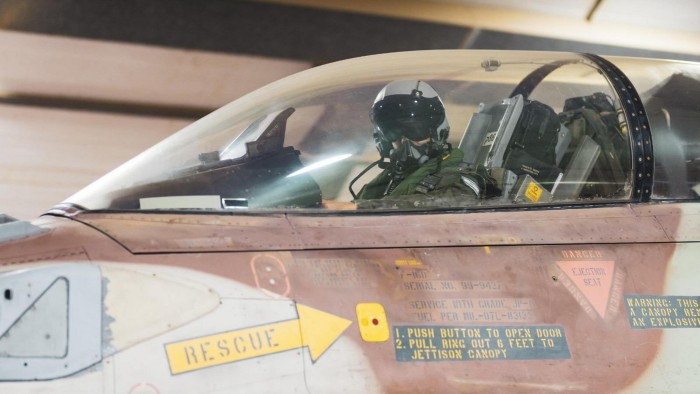Benjamin Netanyahu has spent most of his political career pledging to do whatever it takes to stop Iran getting nuclear weapons. In the early hours of Friday, the Israeli prime minister tried to do just that, sending more than 200 aircraft to strike targets throughout Iran in the most destructive assault the Islamic republic has faced in four decades.
The attack — which targeted Iran’s nuclear sites, missile and air-defence systems, and killed key military commanders and scientists — followed almost two years of spiralling conflict in the Middle East during which Israel and Iran, its greatest adversary, have slid relentlessly towards war.
In that time, Israeli strikes have hobbled Iran’s regional allies: they have defanged Hizbollah, contributed to the collapse of the Assad regime in Syria, and wrought untold horror in Gaza in Netanyahu’s quest to destroy Hamas, the Palestinian militant group whose October 7 2023 attack on Israel triggered the past 20 months of hostilities.
But analysts said the direct attack on Iran — turning the decades-long shadow war between the two most powerful actors in the Middle East into all-out conflict — was Netanyahu’s most fateful decision to date.
“For the past two decades Iran was the number one thing for Netanyahu,” said Aviv Bushinsky, who served as his chief of staff in the 1990s. “This is the most significant thing he has done.”

Israeli military officials said the decision to strike had been taken because Iran’s nuclear programme had advanced to a stage where it was close to being able to develop a bomb, despite years of covert Israeli attempts to derail it.
Another part of their calculations was the belief that Israel’s weakening of the Lebanese militant group Hizbollah — Iran’s most powerful proxy — and the damage done to Iran’s air defences and missile production facilities by Israeli strikes last year had provided a window of opportunity for a strike that would close if Iran and Hizbollah were given longer to rebuild.
“We cannot afford to wait for another time to operate, we have no other choice,” said Eyal Zamir, the chief of staff of Israel’s military. “Recent and past events of history have taught us that when the enemy is attempting to destroy us, we must not turn a blind eye.”
But Ellie Geranmayeh, from the European Council on Foreign Relations, said blowing up efforts to force Tehran to abandon its nuclear programme through diplomatic pressure — something Netanyahu had always opposed — had also been a factor. “It is clear their timing and large-scale nature was intended to completely derail talks,” she said.
Analysts said Netanyahu’s decision was also a sign of how he had been emboldened by Israel’s military successes against Iranian proxies over the past two years throughout the Middle East, as well as by the arrival of Donald Trump in the White House.
Whereas Joe Biden’s administration pressured Netanyahu’s far-right government on various issues, ranging from the humanitarian catastrophe in Gaza to its creeping annexation of the occupied West Bank, Trump’s administration has been far more accommodating.
A person familiar with the situation said the decision to do final preparation for the strikes had been taken on Monday, and that the Trump administration had been in the loop and had not objected to Netanyahu’s plans. “The US was in the know all along,” the person said.

But analysts said that despite the tacit backing from the US, the operation — which an Israeli official said could last up to two weeks — was fraught with both military and political dangers for Netanyahu.
In the short term, the biggest risk is that Iran’s retaliation sparks a far bigger conflict. The Islamic republic still has a large arsenal of ballistic missiles at its disposal and has threatened to use them not just against Israel but also against US targets in the region, raising the risk that Washington could be drawn into the fighting.
Although Hizbollah had been severely damaged by Israel’s strikes last year, a wounded Iran could also push the militant group to use its remaining capabilities now, the analysts said. Iran-aligned militants in Yemen and Iraq could also step up their rocket launches against Israel.
Helped by the US, UK and other countries in the region, Israel was largely successful in warding off the two missile barrages Iran fired at Israel last year, when the two foes exchanged direct fire for the first time ever.
But given the scale and significance of Israel’s attack, officials are bracing for a much bigger response, and the risk of Iranian strikes causing serious damage to infrastructure as well as civilian casualties.
In the immediate aftermath of Israel’s strikes, Israelis rallied around the flag, with opposition politicians such as Yair Lapid and Yair Golan backing the operation, just days after trying to bring down Netanyahu’s coalition. But analysts said that if the exchanges escalated into a protracted conflict with heavy casualties, public opinion could shift.
“The war in Gaza started with high support, time can make people change their minds, especially if they have to spend too long in shelters,” said Nadav Shtrauchler, a political consultant who has previously worked with Netanyahu.
“We understand that we are in a different situation than we have been in before. But I don’t think people think that this is the wrong move right now.”
In the longer term, the question is whether Netanyahu’s decision to carry out the strike on Iran without US involvement means that Israel succeeds only in setting Tehran’s programme back for a short period, rather than destroying it.
But Bushinsky said that even if Israel did not succeed in totally eradicating Iran’s capabilities, Netanyahu — who has been desperate to salvage his reputation after the catastrophic failures of October 7, even branding the ensuing war the “war of redemption” — had changed the way he would be remembered.
“I don’t know if this will be a game-changer strategically. Maybe the Iranians will claim their programme was barely hit, and they can get it running again. And maybe they will be right. But for the way Netanyahu will be remembered, I think it is a game-changer,” he said.
“It won’t erase his responsibility for the [failures] on October 7. But it will remove some of the stains.”







